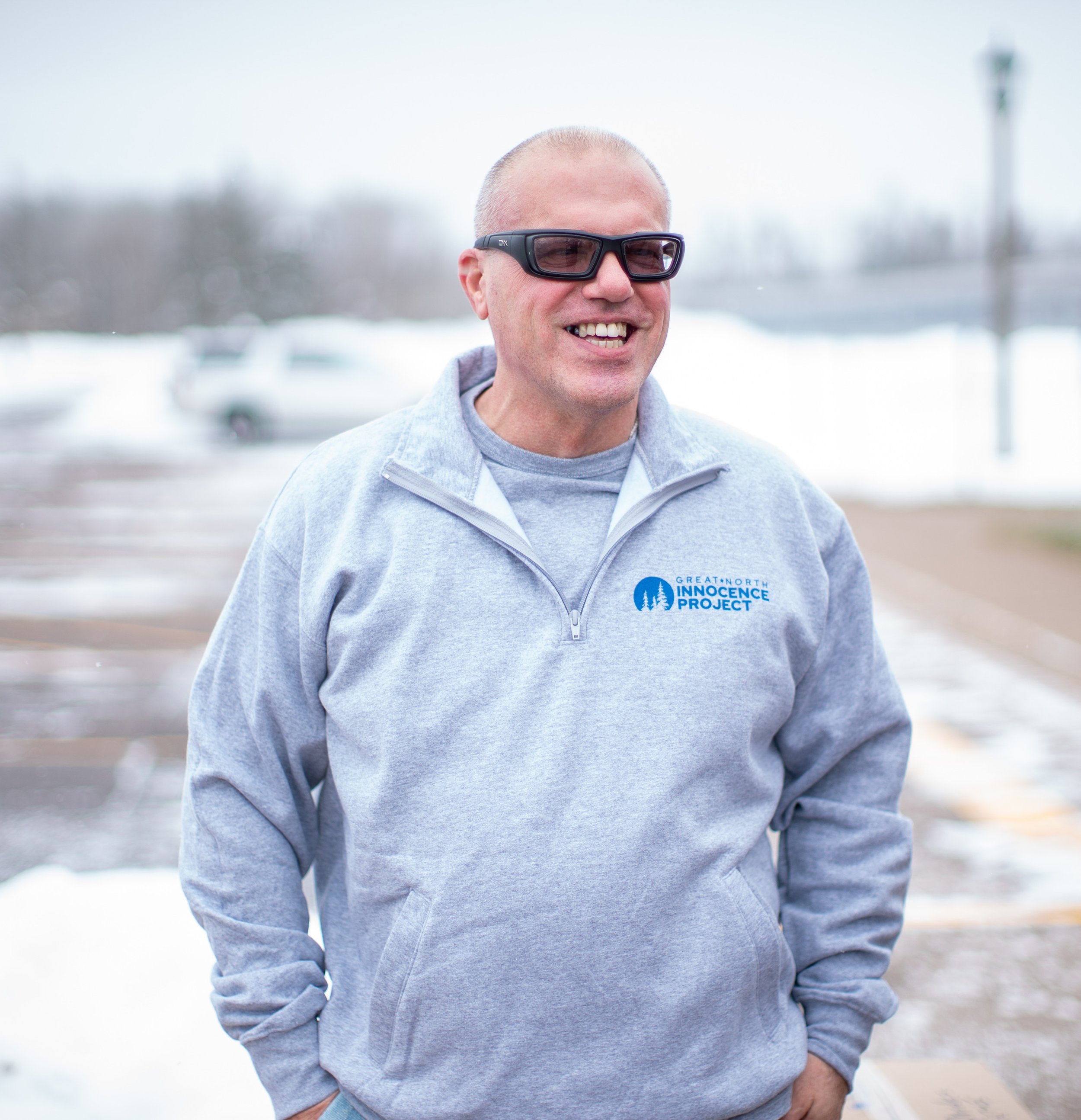The Throughline
Hope is essential to Sara Jones, the team she leads and their clients. Sara is the executive director of the Great North Innocence Project (GNIP). They work to free people who were wrongly convicted in Minnesota, North Dakota and South Dakota, and advocate to reduce the risk of wrongful convictions. It is hard and emotional work, and as Sara explained hope is the throughline.
GNIP Staff with client Robert Kaiser
Photo credit: GNIP
GNIP began in 2001 as the Innocence Project of Minnesota. Sara became the executive director in 2018. In 2019, they rebranded to GNIP to reflect their formal expansion into North Dakota and South Dakota. Today, they are a staff of six with half the staff dedicated to investigating claims of innocence from all three states and occasionally other states, if the local Innocence Project doesn’t have capacity. Sara described the last few years as a huge time of growth and a wild ride, but says she could not ask for a better, more committed group of people to work with.
GNIP receives approximately 300 - 400 requests for help each year. Requests have to meet three requirements to be reviewed:
The incarcerated person needs to write to them directly to request help. If this presents an obstacle, GNIP will try contacting the prison to see if someone can help draft correspondence;
The appeals process needs to be complete, and;
New evidence needs to be presented that supports the person’s claim of innocence.
GNIP weeds out requests that are essentially someone feeling they got a raw deal but provide no evidence of innocence. In cases where they believe there is evidence supporting innocence, they gather more information. Law school students in one of four law clinics managed by GNIP attorneys, conduct investigations. They review trial transcripts, evidence gathered by law enforcement and prosecution and defense files. If the additional information supports a case for release, GNIP begins a formal investigation. At this time approximately 62 preliminary investigations are underway.
Once a formal investigation begins, GNIP is often looking for a needle in a haystack in terms of evidence. Also, they are going in reverse, because their clients are no longer innocent until proven guilty. They’re guilty until proven innocent. Currently, GNIP is formally representing clients in 17 cases. It is not uncommon for GNIP to bring in additional investigators, attorneys and expert witnesses to help win a release.
GNIP client Thomas Rhodes
Photo credit: Fong Lee
Hope fuels the GNIP staff and clients through the long and arduous investigation. In the case of Thomas Rhodes, who was recently released after 25 years in prison, GNIP started investigating his case in 2013. Sara is amazed at their clients ability to remain hopeful, especially when they run into deadends and brick walls.
It is the brickwalls and deadends that inform GNIP’s advocacy work. Sara said it often feels like “whack a mole” trying to change laws to reduce the risk of wrongful convictions and legal statutes that make it difficult to free a wrongly convicted person. However, Sara is encouraged that increasingly prosecutors are not just focused on being tough on crime. They want to be guardians of justice and make sure their convictions have integrity. A great example of this is Ramsey County District Attorney John Choi’s recent decision to review 70 convictions by his office.
GNIP also is a driving force behind the Conviction Review Unit (CRU) in the Minnesota Attorney General’s Office. The creation of the office was a hope they made real. After Keith Ellison took office, GNIP began meetings with him and others from his office to discuss the creation of it. As work progressed, representatives from the Quattrone Center at the University of Pennsylvania, a nationally respected research and policy hub working to improve our criminal justice system, brought their expertise to the group. Minnesota’s CRU launched in August 2021, and the first case it reviewed was Thomas Rhodes.
GNIP works hard to build relationships with prosecutors, law enforcement and legislators across Minnesota. Building these relationships takes time, but Sara says it is time well spent. She has not met anyone who wants innocent people in prison.
Sara said a lot of people confess to crimes they didn’t do because the police manipulate and lie to them in order to get a confession. That may be hard to believe, but she says until you have been in that situation, you can’t imagine the amount of pressure and stress people are put under. People opt to go to trial thinking they will be found innocent because they are. But then the suppression of evidence, bad science or some technicality lands them in prison
None of us thinks a wrongful conviction could happen to us or someone we love, but it happens every day. GNIP gives us all hope that innocent people will be set free and that we or someone we love will not be touched by the nightmare of a wrongful conviction.
Learn More
Please visit the Great North Innocence Project to learn more about their work, the people who do it, make a donation and hear directly from the people whose releases they secured.
Also, GNIP is a founding member of the Innocence Network, which includes 71 Innocence Projects from around the world.
Recently, GNIP was featured on WCCO. If you missed the segment, it is definitely worth watching.



